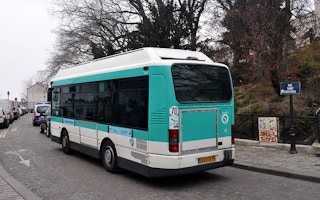Diesel vehicles on city streets will soon be a thing of the past in Athens, Madrid, Mexico City and Paris.
The leaders of those four cities last week announced a sweeping ban, set to take place by 2025, at an international mayors summit on climate change.
The move comes as cities worldwide are taking a harder look at how they can reduce their greenhouse-gas emissions in the transportation sector, and by extension improve their air quality.
The four mayors signed a declaration focused on air quality and made clear that their intention was to send a signal to industry.
“Mayors have already stood up to say that the climate change is one of the greatest challenges we face,” said Paris Mayor Anne Hidalgo during the announcement Friday at the biennial C40 Mayors Summit.
“Today, we also stand up to say we no longer tolerate air pollution and the health problems and deaths it causes — particularly for our most vulnerable citizens. Big problems like air pollution require bold action, and we call on car and bus manufacturers to join us.”
Hidalgo and other mayors made the announcement as the French capital suffers its worst winter air pollution in a decade, according to broadcaster France24.
“
Big problems like air pollution require bold action, and we call on car and bus manufacturers to join us.
Anne Hidalgo, mayor, Paris
A combination of vehicle emissions and forest fires have left a stagnant cloud of particulate matter over the city, smudging views of the Eiffel Tower.
This week, Hidalgo tweeted an image of a smoggy Paris with the message: “#Paris today. Proof that it’s necessary to reduce the presence of cars in downtown #pollution.”
The World Health Organisation attributes 3 million deaths annually to outdoor air pollution, the vast majority of those claiming the lives of people who live in cities. Soot from diesel engines — long valued for their high fuel economy — is a major contributor to the problem.
The WHO estimates that 92 per cent of the world’s population lives in places exceeding the agency’s standards for safe levels of air pollution.
In July, the WHO and the U. N.Environmental Programme launched the Breathe Life campaign with support from the Norwegian government. Its goal is to cut in half deaths related to air pollution by 2030, in support of the new Sustainable Development Goals development framework.
Major health impact
Smog has become as much a part of Parisian daily life as cafés and baguettes. Last year, the City of Light briefly topped the world’s worst cities for air quality, beating out even perennial offenders such as New Delhi. According to health experts,diesel emissions were a main culprit; most vehicles on Parisian streets are diesels.
Hidalgo already has banned all cars manufactured before 1997. Last year, the city embarked on its first car-free day, shutting down nearly a third of the city to automobiles.
The experiment yielded rapid results, with nitrogen-dioxide levels dropping by 40 per cent. according to monitoring site Airparif.
This year, Paris embarked on monthly car-free Sundays in a smaller area that includes the iconic Champs Elysées boulevard. And it repeated last year’s larger “journée sans voiture” again in September, this time covering nearly every part of the capital.
This story was published with permission from Citiscope, a nonprofit news outlet that covers innovations in cities around the world. More at Citiscope.org.

















